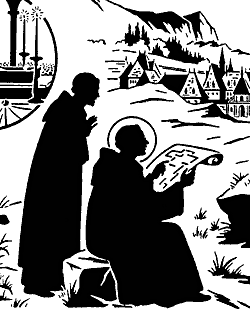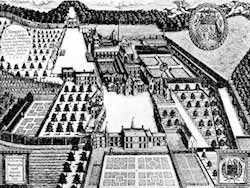St. Norbert ( 1080- 1133)
 |
|
The hard life he led, as “Apostolic Missionary” put Fr. Norbert on his deathbead one time. But God spared him because of his good works. As soon as he recovered, he set out again on his Missionary journeys. Everywhere he went, people looked upon him as a man of God, and received him joyfully. His success was great indeed.
Pope Gelasius died and St. Norbert went to speak to the new Holy Father, Pope Calixtus, at the Council of Reims. The Pope was very impressed with the work of St. Norbert and begged him to go and reform the Abbey of St. Martin in Laon. Fr. Norbert was not keen on this, but he obeyed the Pope and set out for the diocese of Laon. Again he failed. The Canons did not want him there; they did not want to change their worldly lives. So after three months, St. Norbert decided to leave Laon.
Fr. Norbert then went to see Bishop Bartholomew of Laon. The Bishop saw that Norbert was a saint, and wanted to keep him. He asked Fr. Norbert to found a religious order in Laon so that others could carry on the good works of his order after he died.
St. Norbert did not want to live near the city, so he chose a place called Premontre, which was about ten miles away from Laon. In Premontre, there was a lonely valley shaped in the form of a cross. An abandoned Chapel stood there, named after St. John the Baptist. St. Norbert stayed in the valley and spent the night in prayer. There the Blessed Virgin Mary appeared to him and told him to found a religious order. The order was called the Premonstratensians or Norbertines.
Gradually men came to join St. Norbert. The first disciples were seven young men who came from wealthy families. They joined the holy priest, giving up all, to follow a life of prayer and penance.
He gave them the Rule of St. Austin and a habit explaining, “Take and wear this white habit. It is white to remind you that as a priest, you must always continue to be pure like the Angels. Always remember the words of Jesus, ‘Blessed are the pure of heart, for they shall see God.’ He continued, “I want you to unite your work as a priest in the country with the monastic way of life. God Bless you.”
At first, The Canons Regular, or Premonstratensians, as they were called, lived in huts of wood and clay. These huts were arranged like a camp around the Chapel of St. John the Baptist. Soon they had to build a larger Church and a Monastery, because many more religious came to join them. Yet, with this new job of forming young men for the religious life, St. Norbert still remained the Apostolic Missionary, preaching and fighting Heresy, (lies about the Catholic Church).
St. Norbert also
went to a place called Soissons. There he told a man by the name of Abelard
to correct his ways. Abelard disliked Fr. Norbert, but saw that he was
popular with the people and loved by them. Because of this Abelard was
afraid, but he still tried to prove Norbert was a false teacher. However,
God was helping St. Norbert, who always tried to crush Heresy, and Abelard
was not able to weaken the saintly priest.
The dearest thing to St. Norbert’s heart was the forming of good and holy priests. To gain new Monks, he continued his Missionary efforts. He drew so many after him that in a short time, he had forty religious studying for the priesthood! He also had a great number of Lay Brothers who all lived in the huts around the chapel in Premontre. One day, St. Augustine appeared to St. Norbert and explained to him about the Augustinian Rule, which Fr. Norbert had his Monks follow.
|
|
St. Norbert set up a Convent for some Norbertine Nuns, and also a Third Order for people living in the world. The thing most outstanding about the Norbertines was their zeal for spreading and increasing devotion to the Blessed Sacrament and also to the Mother of God. St. Norbert had a special love for the Eucharist and he is usually pictured holding a Monstrance. The Monstrance is always a sign of Norbert’s devotion to the Blessed Sacrament, and a reminder of his victories over the teachings of Heretics, (people who believe lies about the Catholic Church).
St. Norbert never undertook any important work without saying Mass and spending hours in Church before the Blessed Sacrament. He would console his religious by saying, “Cleanliness about the altar, for on the altar one proves the liveliness of his Faith, and the fervour of his Love.”
A great miracle occurred one time while St. Norbert was saying Mass. On the paten, just before Communion, he noticed a large red drop of the Precious Blood, all surrounded by rays of light, which came from the Sacred Heart. He turned to his Deacon saying, “Brother, do you see what I see?” The deacon replied, “I do, Father.” The altar stone upon which this miracle occurred has always been kept in the Monastery at Floreffe.
God also blessed St. Norbert with the amazing growth of his new order. In the first five years alone, ten new places were founded. In thirty years, the order could count over a hundred Abbots at the General Chapter. The number of his disciples that were gathered in such a short time seems fantastic. But one must think also, of the times that St. Norbert was living in. People were lax in their Faith, and groups of Heretics were everywhere.
One Heresy that stands out in St. Norbert’s time was that of a layman called Tanchelm. He preached lies about the Catholic Church in Antwerp and the surrounding country. The Sacraments were attacked and all authority was sneered at. He caused many people to believe his horrible lies and even tried to get the Pope’s approval on his group of followers. He died in 1115, but his false doctrine carried on. People were so confused that they adored Tanchelm as the Son of God!!! What a shameful thing to do.
In 1119, the Bishop of Cambray, sent twelve Canons to Antwerp to try and crush this Heresy, but they found the task too difficult. The Heresy was too deeply rooted in the people’s hearts and minds. The Bishop then decided that the only man capable of doing this work was Fr. Norbert.
The people believed that Fr. Norbert was a saint. The holiness of St. Norbert and his zealous companions, soon won the hearts of the people. They became true penitents. The entire city converted! So great was the love and admiration for St. Norbert, that he was called the, “Apostle of the Blessed Sacrament.” Norbert ordered that solemn services of reparation should be done, to make up for the terrible sacrileges that had taken place in Antwerp and the surrounding country for so many years!
In 1134, Fr. Norbert’s end was near. His strict fasts and penances, and his exposure to all kinds of weather, had weakened him. He died after a long illness, on June 6th, 1134. But he is not forgotten, and St. Norbert stands out in history as a great lover of Jesus in the Blessed Sacrament.
We should all pray to St. Norbert to help us to have a great love for Jesus in the Blessed Sacrament, too. Jesus is waiting for us to come and visit Him, Love Him and Adore Him. And we should want to because Jesus is God!
When we receive Jesus, let us also keep Him company, by Adoring Him, Loving Him and Talking to Him for at least ten minutes. Tell Jesus your worries, your interests and your needs. Because of your visits to Jesus, He will always take care of you during your life, and He will give you special help at your death. Remember also, to pray to Our Lady, the Mother of Jesus and Our Mother, to help you love Jesus, Mary, and Joseph, more and more every day of your life.
St. Norbert, Pray for Us!
The End
Home | Contact
| Mass Centres | Schools
| Pilgrimages | Retreats
|
Precious Blood Residence
District Superior's
Ltrs | Superor General's
Ltrs | Various
Newsletter | Eucharistic
Crusade | Rosary Clarion | For
the Clergy | Coast to Coast |
Saints | Links
